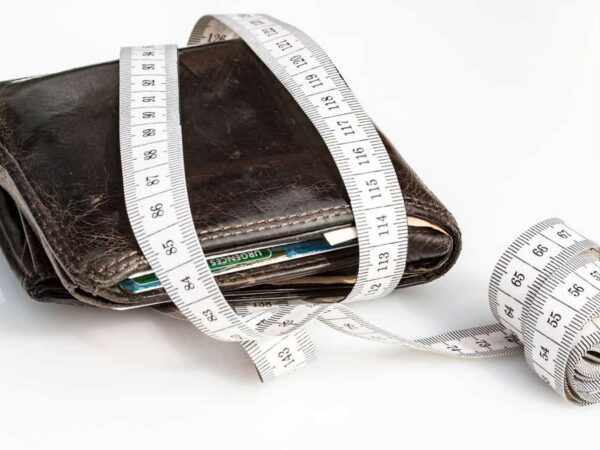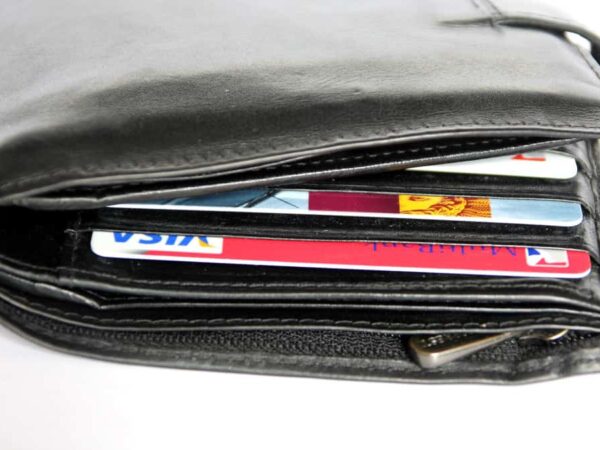Business Credit vs Personal Credit: Differences, Tips, Mistakes to Avoid
Find out the difference between your personal and business credit. Find out the various ways you can establish business credit.

Keeping business and personal credit separate can be tricky for small businesses, especially when you are the business. Even if you’re the sole business owner, experts recommend having a clear distinction between your personal and business finances. Building business credit aside from your personal credit is part of that equation.
To some extent, your business and personal credit may remain linked, no matter how hard you work to keep them separate. For example, if you’re applying for financing and don’t have a long enough business history to qualify, you may need to add your personal guarantee into the mix. Here are a few other important things to know about business credit vs personal credit.
What’s the difference between business and personal credit?
Your personal credit is connected to you by your Social Security Number. Your business credit history is linked to you by your Employer Identification Number (EIN) or Tax ID Number, which is how the government recognizes your business for tax purposes. You can apply for an EIN online and receive it almost instantly. Technically, if you’re a sole proprietor, you don’t need an EIN for taxes, but to establish business credit, you do.
Your personal credit history is curated by the three major credit bureaus, Equifax, Experian, and Transunion, and you have one profile with each. Experian and Equifax also have business credit reporting services. Your business profile is separate from your personal credit history.
There are credit reporting services that only deal with businesses, with Dun & Bradstreet being the largest and best known. If you have more than one business, you can have a separate report for each, as long as it has its own EIN.
Personal vs. business credit scores
Your personal credit is frequently summarized into a single number that helps creditors see where you stand at a glance. FICO is the most commonly used method of scoring personal credit. There is no equivalent for businesses; each commercial credit bureau scores and reports its own way.
The most important factors for scoring businesses are usually how you pay your bills, how much debt you carry, and what type of industry you’re in. Generally speaking, business credit scores have fewer variables than FICO scores, and it is easier to improve the score for a business than it is for an individual.
On the downside, there are fewer legal protections for business credit. While consumer credit laws allow you to challenge anything on your report and have incorrect entries removed, there are no such laws when it comes to commercial credit. That means if there are issues with your business credit report, you could have a much tougher time getting those dealt with. Small business owners can challenge discrepancies with the agency that has them listed, but the agency doesn’t have to respond.
Why do I need business credit?
In many cases, you won’t be able to complete business transactions if your business doesn’t have available credit. Lenders will use a business’s credit history when figuring out whether or not to loan the business money. You’ll also need credit to get business insurance. In many instances, you won’t be able to buy goods and services for your business without access to credit.
Why can’t you use your personal credit for all of that? In some cases you can, but you really shouldn’t. First, the IRS has strict rules about mixing personal and business expenses. Using personal checks or a personal credit card for business purposes makes your bookkeeping much tougher. Most people also believe your business looks a lot more professional when you pay for business expenses with dedicated business funds.
Perhaps most importantly, if you use personal credit to run your business, you put yourself and your family at risk if your business experiences bankruptcies or other financial troubles. Creditors will then come after you, as you will be personally liable for the expenses incurred by the business.
When personal and business credit mix
There are times your personal and business credit will affect each other, especially if you’re a sole proprietor. In most cases, your personal credit will impact your business far more than the other way around.
Some business credit card applications will require your Social Security Number. A landlord may want to run a personal credit check before leasing you a space. A small business loan may need a personal guarantee. In fact, under some circumstances, the Fair Credit Reporting Act does allow lenders to review the personal credit history of sole proprietors for business lending purposes.
If you can avoid using your Social Security Number (and hence, allowing access to your personal credit history) for business purposes, that will help keep the two separate. Credit bureaus don’t distinguish between business and personal inquiries, and incurring too many business-related credit inquiries can have a negative impact on your personal credit score.
For small businesses, your personal and business credit scores can be very closely linked, so it’s smart and important to protect both.
Business credit vs. personal credit FAQs
When it comes to the minutiae of business and personal credit, it can be easy to get lost. Here are some questions new entrepreneurs frequently ask about mixing business credit with personal credit.
Is it possible to build business credit if you have bad personal credit?
Since business and personal credit files are separate, it’s possible to establish strong business credit even if you have a low personal credit rating. The trick is to firmly distinguish your business credit from your personal credit before you start trying to build your business credit score.
You can do this by always paying your business expenses through a business bank account or business credit card, and always depositing business income in a business account before writing yourself a paycheck. Whenever you apply for new lines of credit, business credit cards, or bank accounts for your business, try to always use your EIN rather than your Social Security Number. This will maximize the separation between your business and personal accounts, helping you grow your business credit history independently of your personal credit baggage. Once your accounts are separate, you’ll be able to really focus on building up your business credit history (see “How can I build business credit?” below).
Is business credit just a safeguard for personal credit?
Business credit is more than just a veil for liability purposes. In fact, the U.S. Small Business Administration recommends thinking of your business credit report as a gauge for the financial history and reputation of your business. There are a number of benefits to maintaining good business credit. These include:
Access to funding
Bad business credit is more common — and more detrimental — than you might think. In 2021, about 27% of businesses surveyed by the NSBA claimed they were unable to secure the funding they needed. The same survey reported that a whopping 20% of business loan applications were denied because of bad business credit.
Conversely, when you have good business credit, it’s much easier to access funding opportunities. Need a small business loan? Youre much more likely to qualify. Emergency relief? At your fingertips. Plus, a higher credit score will help you secure a wider variety of loan options, lower interest rates, and better loan terms.
Higher credit limits
Small business credit cards and lines of credit often come with more business benefits than personal credit accounts. You are more likely to receive bonus rewards on phone bills, online advertising, or office supplies, for instance.
The limit you’re offered on your business credit card may also be higher than what you qualify for on your personal cards. Usually, that limit comes down to the lender’s analysis of your personal income, business revenue, and overall creditworthiness. Having a higher limit on your business card can be especially useful if you have high operating or inventory costs each month and don’t want that spending to negatively impact your personal credit utilization ratio.
Better terms from suppliers
One of the biggest benefits of building your business credit — and keeping it separate from your personal credit — is that when it comes time to purchase additional equipment and inventory, you’ll have a solid enough financial reputation to do so. As long as your suppliers trust that your cash flow is stable and that you will repay your debts on time, they won’t see you as a credit risk. They’ll be more comfortable in both allowing you to purchase on credit, and in giving you better terms when you do.
Does business credit affect my personal credit, or vice versa?
It’s important to separate your personal and business credit as much as possible. However, even if you do your best, they can still both impact your business. Just how much depends on the lender or loan issuer.
On some loan, credit, or lease applications, your lender or landlord will ask for your Social Security Number, either in addition to or instead of your EIN. This generally means that your personal credit report is being reviewed.
Similarly, if you’re using personal assets or personal liability to secure a loan and don’t have a lot of business credit built up, your personal credit history will likely come into play to fill in the gaps. (This is especially true if you’re a sole proprietor versus part of a partnership business.) However, if a lender only asks for your EIN, it’s likely that they won’t look at your personal finances. In this case, your personal credit isn’t likely to impact your business credit.
Conversely, your business credit can also impact your personal credit. Again, this depends on the lender or creditor’s policies. For instance, some business credit card issuers report all business card activity to the credit bureaus (Equifax, Experian, and TransUnion). This can have an impact on your personal credit history and credit score. Other credit card issuers, however, only issue reports in cases of default. Here’s a rundown of some of the bigger issuers’ policies:
- Capital One: Reports all activity
- Chase: Reports in case of default
- Discover: Reports all activity
- Bank of America: Reports if the account is delinquent
- Citi: Reports all activity
- Wells Fargo: Does not report
- PNC: Does not report
- American Express: Reports in case of default
How can I build business credit?
The easiest way to establish business credit is to keep all your personal and business finances separate from the get-go. You can also:
Open a separate business checking account
Use your business checking account to pay the business’s bills and employees, including yourself. If you’re incorporated, you have to do this, but it’s good advice for ALL businesses. Use the EIN we discussed above to apply for the account, and use a separate business mailing address and telephone number, even if it’s for a mobile phone.
Pay your bills on time
Negative payment history, including both late and missing payments, is one of the big red flags credit bureaus look for when calculating a business’s credit scores. To avoid adverse impacts to your business credit rating, try to pay your bills on time (or early if you can). This shows future lenders that you’re a reliable borrower. It can also help boost your credit score, unlocking higher loan amounts and lower interest rates.
Apply for and use a business credit card
Pay business expenses with this card, not with your own personal card. This not only makes tracking expenses much easier, but it helps you build credit for the business as you use and pay off the card. If you can’t qualify for a business card immediately, start with a secured card, which is backed by money you put in the account to guarantee you’ll pay.
Ask for credit terms from your vendors
Even if the credit limit is small to start and the time frame is relatively short, asking for a small advance will help you build your credit. Pay the bills on time, and after a few transactions, ask to have the limit and/or term increased. Success with even one or two vendors will give you positive credit references to build on in the future.
Apply for a small loan
Since your goal is to build business credit, a lender that reports to credit bureaus can help boost your ratings. Take out a small loan, such as a working capital loan, from such a lender and set aside the money to pay it off on time. Accion Opportunity Fund (AOF) is one microlender that reports on-time payments to credit bureaus, helping you build credit. AOF provides affordable, flexible capital, and its loans are easier to qualify for than those from other financial institutions.
The other good news is that you don’t always need a Social Security Number to get a loan. Some lenders, like Accion Opportunity Fund, offer loans to individuals with ITINs (Individual Taxpayer Identification Numbers).
Register with the business credit bureaus
Experian and Equifax allow you to open a business credit file. Apply for a DUNS number from Dun & Bradstreet to get started.
Select your business structure carefully
One of the best ways to separate your business and personal finances is to do it legally as well as financially. Instead of setting up your business as a sole proprietorship, take yourself out of the mix and form a corporation or LLC instead. (See our article on the Legal Structure of a Business for the hows and whys.)
What is the difference between business credit and personal credit?
Personal credit is tied to your Social Security Number (SSN) and reflects your history with personal loans, credit cards, and bill payments.
Business credit is linked to your Employer Identification Number (EIN) and tracks your company’s financial behavior, such as paying vendors or taking out business loans.
Example: If you use a personal credit card to buy inventory, it impacts your personal credit. Using a business card does not—if properly separated.
Does my personal credit affect my business credit?
Yes—especially when you’re starting out. If your business has little or no credit history, lenders may rely on your personal credit score when evaluating loan or credit applications.
Example: A business credit card may require a personal guarantee and check your FICO score if your company is new.
Can my business credit affect my personal credit?
Sometimes. If your business credit card issuer reports account activity to consumer credit bureaus, it can show up on your personal credit report—especially if you default.
Example: Capital One and Discover often report both positive and negative activity to personal bureaus.
Can you build business credit if you have bad personal credit?
Yes! Business credit is a separate file. You can build it by paying vendors on time, getting a business credit card, and opening accounts under your EIN—not your SSN.
Example: Apply for a net-30 vendor account that reports to Dun & Bradstreet, even if your personal credit is low.
Does applying for a business credit card affect my personal credit score?
It can—if the issuer checks your personal credit or reports account activity to personal credit bureaus.
Some cards only report in cases of default, while others report everything.
Capital One: reports all activity
Chase & Amex: report only in default
Wells Fargo: does not report
Which business credit cards do not report to personal credit?
Several cards do not report regular activity to consumer credit bureaus, helping keep your personal credit separate. Examples include:
- Chase Ink Business (reports only in default)
- American Express Business (default only)
- Wells Fargo Business (does not report)
- PNC Business (does not report)
?Always confirm the issuer’s policy before applying.
Does an LLC have a credit score?
Yes. An LLC can have its own business credit profile and credit score—if it has an EIN, a DUNS number, and credit accounts in its name.
How do I open a business credit file?
- Apply for an EIN from the IRS
- Get a DUNS number from Dun & Bradstreet
- Open a business bank account
- Open vendor accounts and business credit cards
- Make payments on time
Credit bureaus like Experian Business and Equifax Business will generate a file once you start borrowing under your business identity.
How long does it take to build business credit?
It can take 3 to 6 months to generate a score and 12+ months for stronger limits and better terms—depending on your payment history and number of accounts.
Example: Net-30 accounts and secured credit cards can jumpstart your profile within a few billing cycles.
Can I get business credit without using personal credit?
Yes—but it’s harder. Most lenders check personal credit for new businesses. To qualify with only business credit:
- Build trade lines with vendors
- Apply for EIN-only cards or credit with no personal guarantee
- Work with lenders like Accion Opportunity Fund that offer alternative approval paths
What’s the difference between a business credit card and a personal credit card?
|
Feature |
Business Card |
Personal Card |
|
Linked to |
EIN |
SSN |
|
Reports to |
Business credit bureaus |
Consumer bureaus |
|
Rewards |
Tailored for business (ads, software, etc.) |
Tailored for personal (travel, groceries) |
|
Protections |
Fewer consumer protections |
FCRA and CARD Act apply |
Tip: Never mix purchases—it muddies accounting and credit separation.
What credit score does a business start with?
Business credit scores don’t start at zero like personal FICO scores.
Some start at 100 (Paydex) or 1–100 (Experian Intelliscore) after your first tradeline reports.
You need at least one vendor or lender to report before your score is established.
Explore business funding with Accion Opportunity Fund
Building business credit can open up all kinds of doors. Having a strong financial reputation and a clear credit history can help you qualify for everything from emergency funding and short-term working capital loans, to long-term equipment loans — all of which can help you take your business to the next level.
That said, we at Accion Opportunity Fund understand that building up your business credit takes time. That’s why your credit score is only one of many factors we use to determine your financial health when you apply for our small business loans. We’ll consider your history in business and other details, then issue loan terms customized to your business’s specific needs. If you’re looking for funding to start or grow your small business, take a look at our available small business loans today.




